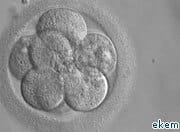The UK’s fertility watchdog has given the green light to British researchers who want to genetically modify human embryos.
The Human Fertilisation and Embryology Authority (HFEA) today granted permission for the Francis Crick Institute to use a controversial technique despite growing fears about the practice.
Scientists at the Institute want to use the Crispr-Cas9 technique on unwanted IVF embryos which, under UK law, cannot then be used for reproduction.
Consumer eugenics
In response, Dr David King, Director of Human Genetics Alert, said: “This research will allow the scientists to refine the techniques for creating GM babies, and many of the government’s scientific advisers have already decided that they are in favour of allowing that.
“So this is the first step in a well mapped-out process leading to GM babies, and a future of consumer eugenics”, he added.
Ahead of today’s decision, CEO of the Christian Medical Fellowship Dr Peter Saunders said that it was both “negligent and disingenuous” of the scientists to claim that the Crispr-Cas9 technique will help reduce miscarriage and infertility.
Dangerous
He explained that the technique cannot fix chromosomal abnormalities, which cause miscarriage and embryo death.
Dr Saunders also commented that while gene editing in fully developed humans has “huge promise”, gene editing of the embryo is “extremely controversial and potentially very dangerous”.
He said: “Scientists around the world think that we are mad in Britain to be pursuing it”.
Full blown eugenics
He added: “I am not alone in remaining sceptical and unconvinced.”
Last year, Dr Calum MacKellar, Director of Research for the Scottish Council on Human Bioethics, warned that allowing the gene editing of embryos “opens the road to genetically modifying all the descendants of a person as well as full blown eugenics which was condemned by all civilised societies after the Second World War”.
Subject to ethical approval, researchers at the Francis Crick Institute could start experiments in the next few months.
Embryos
In 2015 the National Institutes of Health, the medical research agency in the US, said it would not fund the genetic modification of embryos after a team in China used the Crispr-Cas9 technique to alter an abnormal gene.
The researchers in China used embryos discarded by local fertility clinics in their work on a life-threatening blood disorder.


